Erstellt am: 22. 5. 2015 - 13:27 Uhr
The New Front Line?
On a blustery afternoon in early May, the Latvian Prime Minister Laimdota Straujuma, and Latvian President Andris Berzins walked solemnly past a military band and laid a wreath of flowers at the Freedom Monument, a huge concrete column topped by a buxom Liberty that stands tall over the rooftops of Riga’s old town.
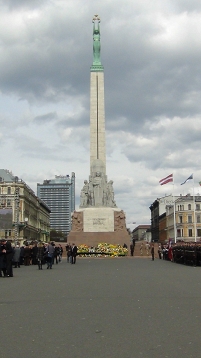
Chris Cummins
They were marking the day 25 years earlier when the Supreme Council of Soviet Latvia announced that it was reinstituting the Latvian constitution - a document that had been quashed after the Baltic State was forcibly annexed by Moscow. It was the key moment in the country’s struggle for freedom.
This Saturday's Reality Check Special comes from Latvia as it marks 25 years of Independence, amid new fears of Russian dominance, and surviving the "world's worst recession". Latvia: Rolling With the Punches on the 23rd May at 12:00
It took more than a year for Latvia’s current post-communist, democratic state to emerge from that declaration - but the struggle became an iconic moment of non-violent protest.
The Singing Revolution
When the forces of the Soviet Union tried to suppress the independence movement, people across the Baltics gathered in huge numbers, held hands and sang. The end of communism in north-east Europe became known as the “Singing Revolution”.
“We didn’t have any weapons or tanks but we got out of the USSR by singing,” Eva Ikstena Strapcane, a TV journalist with Latvian television, told me: “I think we still have that spirit within us. We know the power of singing.”
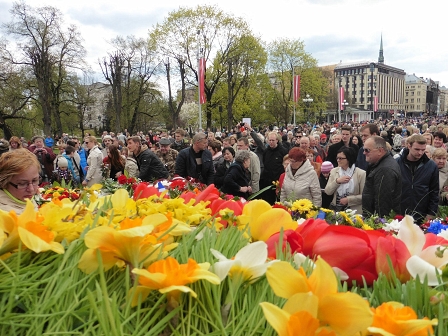
Chris Cummins
Ingemars Dzenis, who runs the hip café VEST just around the corner from the former KGB house, remembers those days of revolution even though he was just a small boy at the time. “I was just 7 or 8 but my parents wanted to see it,” he told me. “They took me to Riga’s old town where there were barricades to stop the soldiers getting in. I remember we had to take our gas masks whenever we went there.”
"Education abroad is always important"
Ingemars is a muscle-bound biker with a hip-hop baseball cap and a love of good coffee. He’s well-travelled but describes himself as a “patriot” who has stayed in Latvia, while others have emigrated to find new opportunities in bigger economies. But Ingemars says he wants to “help build the country.”
That includes, in his view, serving quality burgers from Latvian beef. “People should leave and get educated; education abroad is always good,” he told me, “but I’d like it if they came back one day.” We drank craft Latvian beer together and I told him, truthfully, that it was delicious.
He beamed a smile. If you want to make yourself popular in Latvia, praising the country goes a long way. In European countries where subjugation is a distant memory, it is easy to sneer at patriotism and flag-waving, but here the hard-won fight against oppression is still a living memory.
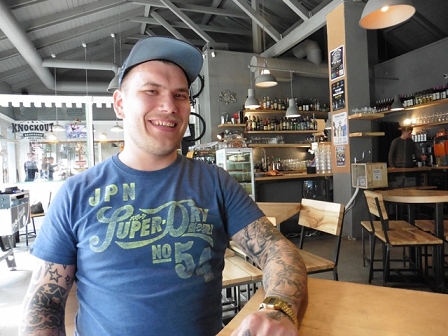
Chris Cummins
"We are small but we are proud"
“I’m here because I love Latvia,” a young woman called Ilona told me when I met her in the crowd gathered at the Freedom Monument. He words reminded me of what TV journalist Eva Ikstena Strapcane had told me earlier. “When two Latvians meet each other abroad and get to talk about Latvian culture or literature, they can’t stop talking for hours. We are proud. We are small but we are proud.”
This wasn’t an obnoxious, tub-thumping form of nationalism; it was the defiant pride of a tiny nation which has rolled with all the many punches recent history has thrown its way.
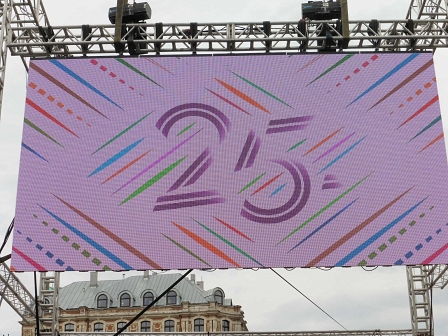
Chris Cummins
This year’s “Restoration of Independence Day” was a particularly significant and poignant occasion not just because of the 25 year milestone but also because it comes as, rightly or wrongly, many Latvians worry about a potential act of aggression from its former occupying power Russia. Events in Ukraine have really shaken up fears in Latvia, which, like Ukraine, also has a sizeable Russian-speaking minority.
On Independence Day, President Berzins made a speech in Jelgava, a town just south of Riga, in which he obliquely outlined those fears “The external security situation has changed,” he told the crowd, “we have had to revise our priorities and pay much more attention to bolstering our defence capacities.”
Betrayal At The Corner House
25 years after the end of communism, the former KGB building in Riga, Latvia, still haunts and divides a nation
Concrete Reaction Plans
Latvia recently bought 123 combat vehicles from Britain in August, and in November agreed to a four million Euro deal with Norway for 800 Carl Gustav anti-tank weapons and 100 armoured trucks. Military analysts say that, behind the scenes, the talk is no longer of hypothetical scenarios but of concrete reaction plans to Russian action, overt or covert, against the Baltic States.
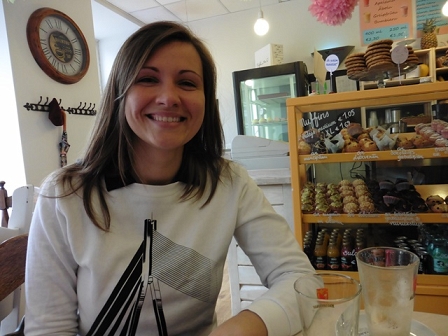
Chris Cummins
“It feels very scary to live on this border right now, knowing that we might be the next target” said Eva Ikstena Strapcane. We were sitting in cramped café just around the corner from the former KGB headquarters , a spectre of what occupation meant here.
But Eva refused to panic. “We have got used to this feeling over the past months and I have a strong feeling that Western countries would support us.”
“An attack on one is an attack on all"
Here’s the big difference to Ukraine: Latvia, like its Baltic neighbours Lithuania and Estonia, is a member of NATO. US President Barack Obama made that abundantly clear in a speech this September in Tallinn, the capital of Estonia, in which he cited the Article 5 of the NATO alliance: “An attack on one is an attack on all. So if, in such a moment, you ever ask again, who’ll come to help, you’ll know the answer: the NATO alliance, including the armed forces of the United States of America, right here, present, now."
Obama asserted that Riga, Vilnius and Tallinn were just as much a defence priority as Berlin, Paris or London and this spring the US sent hundreds of armoured vehicles to Latvia, with thousands of troops to follow in what has been named “Operation Atlantic Resolve”. The military hardware was even showcases on the streets of Riga.
“That was very reassuring.” Krišjanis Ozols of the Latvian Institute told me “A lot of people were very relieved to hear Obama’s words. It made us feel we were relevant, and that our allies hadn’t forgotten us, and that they would react if a similar situation to that in Ukraine should happen in the Baltics.”
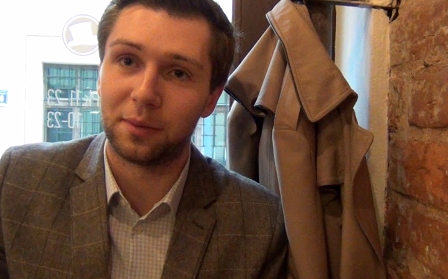
Chris Cummins
But he can’t see any resolution in the near future. “You can’t really focus on establishing peace by displaying military equipment. Yet what can you do if one party is not behaving reasonably? All these questions should be settled in a diplomatic way, and as soon as possible.”
The fear is that, following the example seen in Ukraine, divisions will be stoked as Russian media targets the Russian-speaking minority living in Latvia. These communities, complain many Latvians, are almost wholly shut off from the ethnic-Latvians. Ingemars Dzenis had suggested that many “didn’t want to integrate.”
"A completely separate information world"
Irina Kuznecova from Open Society foundation DOTS, is an ethnic Russian speaker and she admitted that “In some cases people have only Russian friends; they watch only Russian television and read only Russian newspapers. They live in a completely separate information world.” And that TV coverage is often openly hostile to the values of the West.
Maybe youth is Latvia’s greatest hope. Irina belongs to a younger, more educated generation that mixes more freely. “It would be wrong to claim that the Russian speaking community thinks in one direction,” she reminds me, “It is not a homogeneous group.”
Many young Russian speakers have enthusiastically embraced the freedom to travel and the economic opportunities offered by the European Union. They might not speak much Latvian, but they do look west not east.
And the government has made mistakes faced with a historically complicated situation. During the Soviet times tens of thousands of Russians were brought to Latvia, to work in industry but also to dilute the ethnic situation in a country with a population of just 2 million. When the Soviet Union broke up, the independent government decided that the country could only be truly independent if Latvian was the only official language.

Chris Cummins
Those who failed language tests were also denied citizenship and voting rights – becoming “aliens” in their own country. But instead of contributing to nation-building, the policy has, according to Irina Kuznecova, contributed to a growth of alienation.
She says the best way to bolster Latvia’s strength in a non-military way would be to not only make it easier for the Russian minority to learn Latvian, but also to reach out to them on an emotional level. “They need to be told that they are Latvian whatever language they speak and that the country wants them and needs them.”
Dieses Element ist nicht mehr verfügbar


